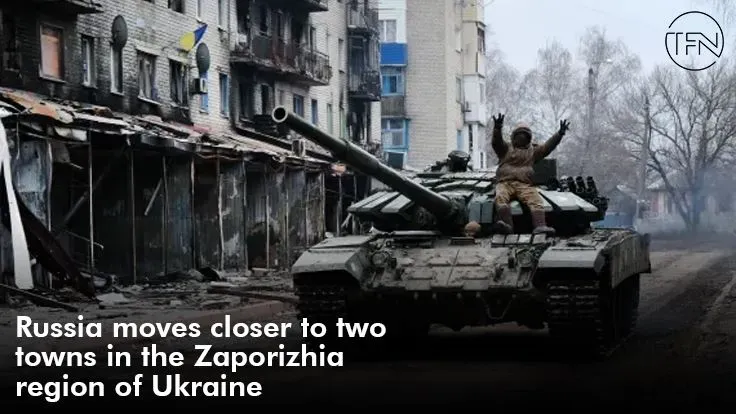According to Russian official media, Moscow's soldiers are moving closer to two towns in the southern Zaporizhia area of Ukraine, where combat has reportedly worsened this week after being static for many months.
According to Vladimir Rogov, a Russian officer stationed in the area, offensive operations were centered on two towns: Hulyaipole, which is located farther east, and Orikhiv, which is roughly 50 kilometers (30 miles) south of the Zaporizhzhia, the regional center under Ukrainian administration.
According to Rogov, "the front is mobile, notably in two directions: Orikhiv and Hulyaipole," the RIA Novosti news agency said on Sunday.
According to him, the agency reported that there was ongoing violence in certain regions.
"We are taking the initiative."
After "offensive operations" in the Zaporizhia area, the Russian army stated for the second day in a row that it had seized "more favorable lines and positions."
Outside the regional capital of Zaporizhzhia, in the town of Lezhyno, where Ukrainian troops have not yet gained control, it claimed to have targeted Ukrainian positions.
The Ukrainian army said that "more than 15 villages were damaged by artillery fire" in Zaporizhia in its daily report on Sunday.
Rogov declared a "local attack" in Orikhiv earlier this week and said the Russian army had taken over the settlement of Lobkove, which is close to the Dnieper River.
Earlier this week, he said that combat had "sharply intensified" in the south.
Since Moscow withdrew from the important city of Kherson in November, the front in southern Ukraine has been much calmer than in the east.
Although it does not have complete authority over Zaporizhia, Russia asserts that it has annexed it together with three other Ukrainian territories.
While Kyiv holds the northern section of the territory and its capital city Zaporizhzhia, Moscow controls substantial portions of the province's southern half.
The claims coincide with a statement made by a Russian official warning that arming Ukraine with more powerful weapons may lead to a "global calamity that would devastate their country."
The lower house speaker of the Russian parliament, Vyacheslav Volodin, cautioned that the choice by other nations to supply Ukraine would result in a "world disaster."
"A counterattack with more powerful weapons would result if Washington and NATO supplied weapons that would be used for hitting civilian communities and making efforts to grab our land as they threaten to do," he stated.
Germany, one of the key arms suppliers to Ukraine, has requested a review of its Leopard 2 stock in anticipation of a potential approval.
However, the Berlin administration has been hesitant to deepen its ties with Ukraine at every turn; this reluctance is said to have historical and cultural roots.
Meanwhile, at ceremonies and meetings held on Sunday to commemorate the 60th anniversary of their post-World War II friendship pact, France and Germany vowed to provide Ukraine with "unwavering solidarity." In a joint statement, the countries vowed to "stand with Ukraine for as long as it takes."
As part of their agreement, they promised to "operate together for a European Union that is more robust, sustainable, and able to act independently." The pact that united bitter rivals France and Germany 60 years ago served as the foundation for the EU today.
Germany's hesitation has come under harsh criticism, notably from Poland and the Baltic states, two NATO members who were formerly under the power of Moscow and now feel particularly threatened by its revived imperial aspirations.
Mateusz Morawiecki, the prime minister of Poland, said that his nation was willing to form a "smaller coalition" of nations that would deploy its Leopard tanks to Ukraine even if Germany refused to allow the transfer.

